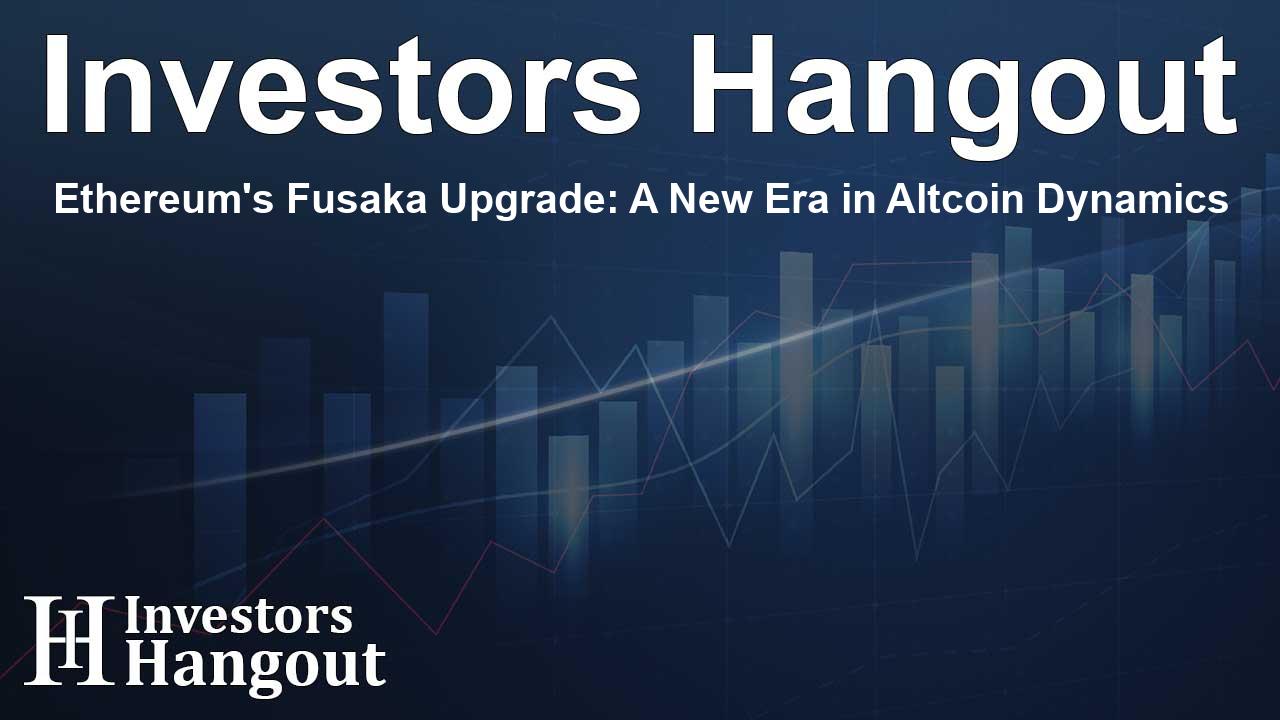Ethereum's Fusaka Upgrade: A New Era in Altcoin Dynamics

Ethereum's Place in the Altcoin Landscape
Ethereum has been a key player in the cryptocurrency space, often regarded as a foundational element for many altcoins. With the shift in market dynamics and a surge in smaller, high-performing cryptocurrencies, traders are starting to rethink where Ethereum stands. The anticipation surrounding the upcoming Fusaka upgrade raises questions about its potential to reclaim its leading position amidst increasing competition.
Understanding the Current Market Pressure
The alt-season typically gains momentum when Bitcoin dominance declines, prompting traders to seek opportunities in alternative crypto assets. In previous cycles, Ethereum has often been the entry point for investors, frequently outpacing other smaller cap coins at the onset of these trends. However, recent observations show that Ethereum is struggling to keep pace while coins like Solana and Avalanche take center stage, attracting interest due to their lower transaction costs and faster processing times.
This ongoing trend presents a dilemma for ETH: its perceived stability may now overshadow its growth potential, causing investors to reconsider holding it strictly as a conservative asset rather than a progressive investment.
Introducing the Fusaka Upgrade
The Fusaka upgrade is poised to be a pivotal moment in Ethereum's evolution, succeeding the Pectra hard fork implemented earlier this year, which significantly increased staking limits and enhanced user experience. At the heart of Fusaka lies a breakthrough known as PeerDAS (Data Availability Sampling), aimed at elevating Ethereum’s capacity to manage data more effectively, particularly for layer-2 rollups. If executed successfully, this innovation could substantially reduce transaction fees and establish Ethereum as a preferred platform for decentralized applications.
Additionally, the introduction of features like the EVM Object Format (EOF) and modifications to blob parameters are designed to optimize developers' workflows and contribute to better cost management. Although these may not be the flashiest updates, they play a crucial role in ensuring Ethereum remains competitive against other chains offering faster, cheaper solutions.
The Investor’s Perspective on Fusaka
For those investing in Ethereum, the Fusaka upgrade represents more than just a technical advancement; it has the potential to significantly alter ETH's tokenomics and its stance in the market:
- Enhanced Staking Dynamics: With larger validator capacities and ongoing yield adjustments, institutions are incentivized to hold onto ETH instead of liquidating it.
- Boosting Layer-2 Activities: Should Fusaka lead to decreased fees for rollups, Ethereum stands to gain a larger share of DeFi and NFT transactions, resulting in heightened transaction revenue.
- Fortifying Competitive Edge: A successful upgrade would reaffirm Ethereum's position as the backbone of the crypto ecosystem, retaining investment flows during alt-seasons instead of ceding them to competitors.
Potential Risks and Challenges
However, the path ahead is filled with potential challenges. The execution of the Fusaka upgrade carries inherent risks, as Ethereum's historical roadmap is replete with delays. The introduction of PeerDAS adds a layer of technical complexity that could lead to extended timelines. Moreover, even if the upgrades are flawlessly implemented, a shift in broader market sentiment could stagnate ETH's price movement. Investors should remain aware that competition is fierce, and the alt-season often hinges more on comparative momentum than just pure innovation.
The Future Outlook
As the market witnesses a rotation towards smaller, promising tokens, Ethereum finds itself under significant pressure to validate its relevance as a critical player in the altcoin market. The Fusaka upgrade, with its focus on enhanced scalability and operational efficiency, presents a crucial opportunity for Ethereum to reclaim its status as a leading platform. Whether it will mark a transformative moment depends largely on the execution of these measures and the agility of developers and users in harnessing these enhancements for economic activities on the platform.
Frequently Asked Questions
What is the Fusaka upgrade?
The Fusaka upgrade is a forthcoming upgrade for Ethereum that aims to improve scalability and efficiency, focusing on new features like PeerDAS to enhance data handling.
How does ETH compare to newer altcoins during alt-seasons?
While Ethereum has historically dominated, its current pace is slower compared to newer altcoins, which offer lower fees and faster processing.
What are the potential benefits of the Fusaka upgrade?
The upgrade could lower transaction fees, enhance staking dynamics, and maintain Ethereum's competitive edge in the blockchain ecosystem.
What risks could impact the Fusaka upgrade's success?
Execution risk, potential delays, and external market sentiment fluctuations could all affect how well the upgrade performs and impacts ETH’s market position.
Why is Ethereum considered a blue chip in crypto?
Ethereum is viewed as a blue-chip asset due to its established network, strong market presence, and foundational role in many decentralized applications.
About The Author
Contact Evelyn Baker privately here. Or send an email with ATTN: Evelyn Baker as the subject to contact@investorshangout.com.
About Investors Hangout
Investors Hangout is a leading online stock forum for financial discussion and learning, offering a wide range of free tools and resources. It draws in traders of all levels, who exchange market knowledge, investigate trading tactics, and keep an eye on industry developments in real time. Featuring financial articles, stock message boards, quotes, charts, company profiles, and live news updates. Through cooperative learning and a wealth of informational resources, it helps users from novices creating their first portfolios to experts honing their techniques. Join Investors Hangout today: https://investorshangout.com/
The content of this article is based on factual, publicly available information and does not represent legal, financial, or investment advice. Investors Hangout does not offer financial advice, and the author is not a licensed financial advisor. Consult a qualified advisor before making any financial or investment decisions based on this article. This article should not be considered advice to purchase, sell, or hold any securities or other investments. If any of the material provided here is inaccurate, please contact us for corrections.
